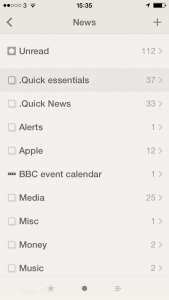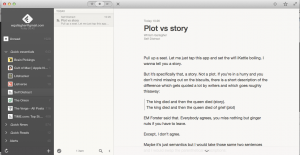First: it is nothing short of wonderful that Veronica Mars has returned. Second: the movie is bliss. Not flawless by any means, but watching it in a cinema was bliss.
But.
The one fly in this whole Kickstarter campaign tale came with the digital download copy of the film that backers got. On release day, we got an email telling us how to download it for free – and because those instructions said we had to use Flixster/Ultraviolet, I just went and bought it from iTunes.
I backed the movie. I got that digital download and still I paid again to buy the movie from iTunes. And I did so because, strange fella that I am, I wanted to be able to watch the thing I downloaded.
True, I still went to see it in the cinema and actually I sat there with the film on my iPhone in my pocket. It was like the reverse of piracy: I could've played it for the audience right there.
The flash-forward quick ending to this is that Warner Brothers has caved in and said okay, enough already, you don't have to use Flixster. I'm sure there must be conditions but I've emailed my iTunes receipt to info@veronicamarsthemovie.com and will report when I get the refund.
Here's the thing, though. I would like you to see Veronica Mars because I enjoyed it so very, very much, but the reason to talk about it here on The Blank Screen is that I think there are productivity lessons to be learnt.
The positive one is that when you know something is wrong, fix it. Warner Bros has quite quickly responded to the criticism of the Flixster debacle and you have to give them credit for that.
But the more negative one is the same: when you know something is wrong, fix it – and Warner Bros did not. Flixster and Ultraviolet is an astonishing disaster of a service. No exaggeration. More than a year ago, I attempted to use it to get digital copies of The Big Bang Theory: I'd bought the DVD, I wanted to watch it on my iPad, it came with all the rights and the download details to do this for free. But I lost an evening trying to get it work. At all. To work at all.
I emailed the support team and explained that the service did not work. Literally did not work. They replied that they were sorry my first experience had been sub-optimal.
That was all, by the way. They had no answer for how to make it work, they just had hopes that I would keep trying.
I do understand why several studios have decided they'd rather not go via Apple's iTunes service. I get that and I'd be the same: naturally Apple takes a cut and the studios would rather keep the money for themselves but also it's risky being beholden to another firm. Apple has them over a barrel if iTunes is the only way to sell films. It isn't, there's Amazon too, but it's no better being beholden to Amazon. So of course some firms got together to make a new service.
Except they didn't.
They didn't get together and they didn't make a new service.
It's not a new service because it isn't a service: it literally does not work. You cannot take that Veronica Mars download code or that Big Bang Theory DVD and get what you want to watch and what you've paid to watch. In more than a year since I first tried it, they have improved one thing: you have to sign up to just two online services instead of three. I think. I may have successfully signed up to one last year. Honestly cannot tell you.
There is now also a bit of PR spin: some poor sod has written a paragraph about why hey, it's great to have two sign-ins!
No, it isn't.
Two (or three) sign-ins is visible evidence of them not getting together and the PR spiel is visible evidence of them recognising that this is crap but not doing anything to fix it. Having to sign up to two or three online sites in order to get one service is more as if all of the companies involved agree that they want to avoid being beholden to Apple and Amazon, but they also don't want to be in any way beholden to each other.
Fine. That makes sense.
Productivity means getting stuff done. Productivity for these fellas is getting films to us. They don't like that their choice is between being beholden to Apple and Amazon or being beholden to each other, but in technical terms that is just tough shit.
Make the choice, any choice, and do it.
If you want to get a particular project going and you can see what your choices are, make a choice now. Do that now. Especially if waiting more than a year means pretending something works when it simply does not. Especially if you manage to pull off something like Veronica Mars.
This film had an audience waiting for it. They paid $5.7m as proof. There are few absolute guaranteed audiences in this world but Veronica Mars had one and there is not one single pixel of doubt that every qualifying backer would download the movie the instant it was available. The audience was coming to Warner Bros and it was the perfect chance to show that iTunes is not the only player in town. The perfect chance to get people actively choosing to use your system and then even to come back to it again to watch this movie again.
This was Flixster's chance. It wouldn't have been easy because of people like myself who had sub-optimal first experiences and would never willingly try a second time. But if it had worked and all these fans were loving that movie immediately, even I would've gone back to try again.
Actually, I did try at one point: it became a game to see if I could figure this stuff out.
But for actually watching the movie, no. I read the email saying it was to be on Flixster and I went straight to iTunes. How bad does your service have to be that someone who has already paid for the film on it would instantly go to your biggest rival and pay money again to get it there?
By the way, do catch it in cinemas if you can. The joy in that auditorium was wonderful.

